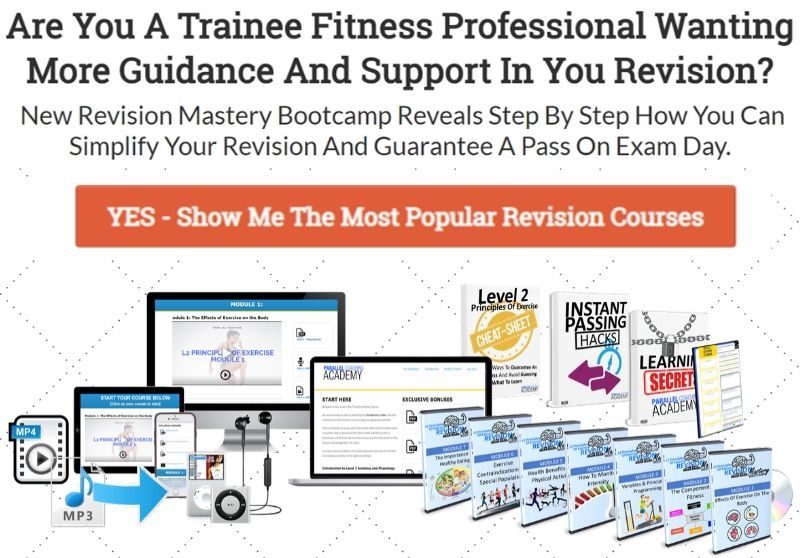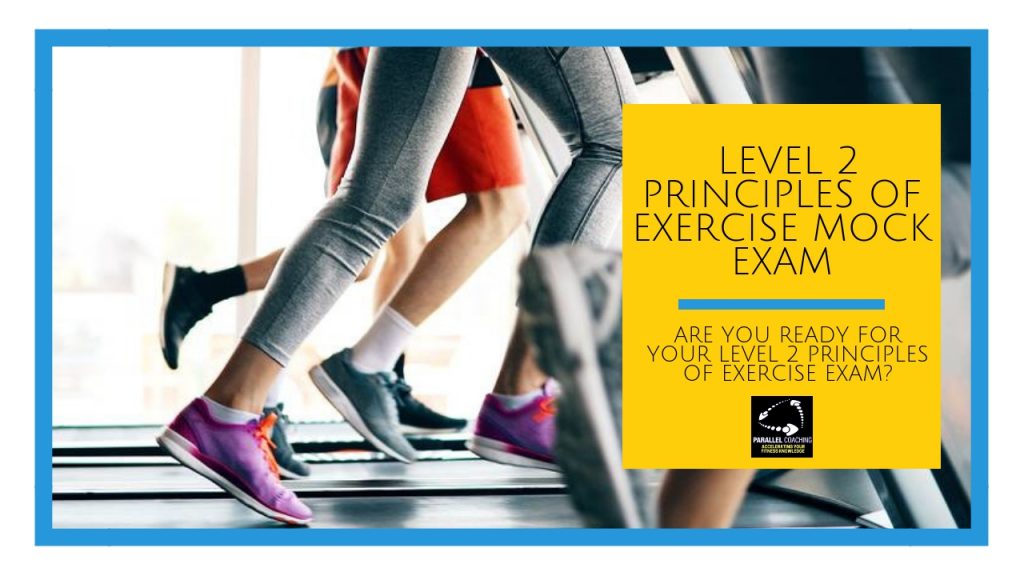This blog includes Twelve Level 2 Principles of Exercise Mock Exam Questions with answers and explanations, so you can be prepared for your upcoming exam.
You’ll:
- Be asked 12 mock questions from the Level 2 Principles of Exercise Fitness and Health
- Be able to check your knowledge with the answers and explanations for each question
- Highlight your strengths and weaknesses within the Principles of Exercise Exam
- Find a new way to simplify your Principles of Exercise Revision
How to use these Mock Questions:
First Read the relevant section in your manual or using our Revision Mastery Bootcamp, and then work through the following 12 mock questions.
Do this under exam conditions. i.e. with no assistance from your book.
This will highlight your strengths and weaknesses within the Principles of Exercise Exam
If you can answer these questions, the likelihood is – you’ll breeze through your exam
Check your answers at the bottom of the page
Level 2 Principles of Exercise Mock Exam
1. Which programme variable is regressed when a session is performed with fewer sets per exercise?
A. Specificity
B. Volume
C. Frequency
D. Type.
2. What is the recommended minimum number of fruit and vegetable portions to eat per day?
A. One
B. Seven
C. Two
D. Five.
3. Which core training exercise would be most appropriate to use immediately post-birth?
A. Jump squats
B. Pelvic floor exercises
C. Full Sit ups
D. Hanging Leg Raises.
4. Having full potential range of motion around a joint defines which component of health-related fitness?
A. Flexibility
B. Strength
C. Balance
D. Agility.
5. Which of the following is the primary role of protein?
A. To help the body to use fat soluble vitamins
B. To provide insulation under the skin
C. To grow and repair human tissue
D. To assist digestion and hydration.
6. A respiratory adaptation to aerobic endurance training is?
A. Reduced cardiac output
B. Reduced stroke volume
C. Increased gaseous exchange
D. Increased lung size.
7. Which of the following is a short term musculoskeletal adaptation to exercise?
A. Joints get stiff and reduce Range of Motion
B. Secretion of synovial fluid increases, lubricating joints
C. Muscles relax
D. The skin reduces in temperature.
8. The anaerobic capacity for boys and girls is not fully developed until the age of:
A.10
B. 14
C. 16
D. 20
9. The phrase ‘use it or lose it’ would describe which training principle?
A. Overload
B. Individuality
C. Specificity
D. Reversibility.
10. Power is a combination of strength and which other skill-related
component of fitness?
A. Speed
B. Agility
C. Endurance
D. Reaction time.
11. Delayed onset muscle soreness is typically experienced at what time
frame after exercise?
A. Within 5 hours
B. Between 6-11 hours
C. Between 12-72 hours
D. After 75 hours.
12. A respiratory adaptation to aerobic endurance training is:
A. Reduced cardiac output
B. Reduced stroke volume
C. Increased gaseous exchange
D. Increased lung size.
↓↓↓ See your answers below ↓↓↓
Now you have completed all 7 questions, check your answers below and if you are looking for more chances to test your knowledge, you can download another 50 mock questions using the link below…
https://revision.parallelcoaching.co.uk/fitness-exam-mock-questions

Answers:
-
- B
Explanation: Adjusting the Sets performed is also adjusting the volume of exercise performed. As part of your Level 2 Principles of Exercise Mock Exam you need to know about the key principles and variables of training including the FITT principle. - D
Explanation: It is recommended by the WHO and FSA that everyone eats 5 fruit and veg per day to maintain good health - B
Explanation: The pelvic floor muscles are stretched and strained during birth, and therefore gentle pelvic floor exercises are beneficial straight away after childbirth - A
Explanation: Flexibility is one of the 5 components of health-related fitness that you need to know for your Level 2 Principles of Exercise Mock Exam and real exam - C
Explanation: Protein is primarily used for Growth and repair in the body. You will also need to know the prime function of Carbohydrates and Fats for your exam - C
Explanation: The lungs do not increase in size, but as a result of exercise gaseous exchange becomes more efficient and increases. - B
Explanation: During exercise, there are a lot of short term physiological changes that occur throughout the body, one of these changes is that synovial fluid in the joints are mobilized and secreted, which allows for smoother articulation at key joints. - D
Explanation: Before puberty and full development is achieved; the organs, muscles, bones and energy systems are still developing. Research shows that children do not fully develop their Anaerobic Energy System until they are 20 years old. - D
Explanation: Reversibility is one of 7 training principles that you need to know for your exam. This indicates that if results will diminish/ reverse if the activity stops. - A
Explanation: Power is the combination of lifting heavy (strength) and with acceleration (speed). Speed +Strength = Power - C
Explanation: DOMS is a recovery response as a result of tearing muscle fibres. Symptoms can be felt 12-72 hours after the muscle has torn and will vary in duration depending on the level of damage, recovery rate, fitness, immunity and nutrition. - C
Explanation: This question is looking for a benefit or a positive adaptation. The first two answers are both negative adaptations (something you wouldnt want). And D is impossible, the lungs cant change size due to exercise (they can change capacity though). Therefore the answer is C= Gaseous Exchange
- B
Need More Help with your Principles Exam Revision?
Discover How 6500+ Fitpros In Training Are Walking Into Their Exam With Confidence And Guaranteeing A Pass
Are you tired of staring at your manual and not knowing where to start?
Our revision mastery bootcamp breaks everything down into a clear and easy to follow structure.
You can download the videos to MP3 and MP4 to slice your revision time in half and finally understand the key principles of exercise.
This is not another course with more exams – it HELPS pass the course you’re already enrolled on!
“EVERYTHING You Need To Learn, Revise And Pass Your Fitness Exam”
If you want to get your revision structured, learn everything you need to know and feel confident on exam day, then click the link below:

Dedicated to More
Hayley “principles of exercise” Bergman
Parallel Coaching
P.S. You can also find us on the following platforms:
Instagram: https://www.instagram.com/parallelcoaching
Facebook: https://www.facebook.com/ParallelCoaching
Twitter: https://twitter.com/ParallelCoach
YouTube: http://bit.ly/2F1Z1bs

